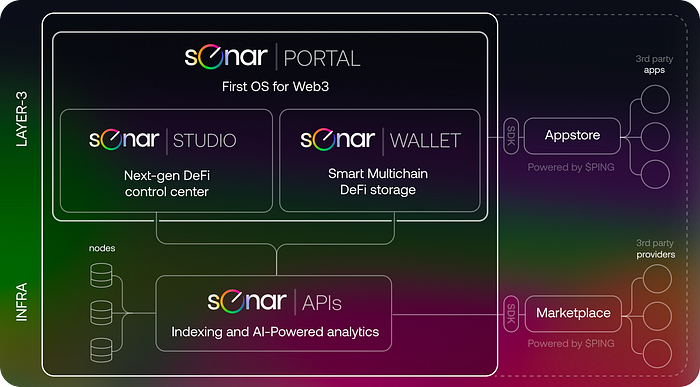Seamless Web3: Project Vision Update — Part #2

Last month, we delved into Sonar’s long-term vision and ultimate objective — the Sonar Portal.
We merely skimmed the surface of our holistic ecosystem strategy, and we were humbled by the overwhelmingly positive response from our vibrant community. Your enthusiastic feedback and visibly increased buying activity signaled a resounding endorsement of our ideas and principles.
Today, we are thrilled to peel back more layers of our vision, offering a sneak peek into some of its exciting new features.
However, we must remain cautious about revealing too much of our intellectual property at this stage, so we are going to ask you to use your imagination.
Now get comfy, lighten up your minds and wonder with us into the Portal realm.
The Interface
At the core of the Sonar Portal experience lies the Flow view, which may appear as a familiar social media feed on the surface, but it represents a significant innovation.
Flow goes beyond a traditional feed and serves as your personal assistant in the web3 world, enabled by AI-powered natural language processing (NLP).

Within Flow, you can perform a wide range of actions and access information by simply using natural language commands. Whether it’s initiating transactions, setting up limit orders and trading automations, displaying or comparing analytics, or learning about protocols and projects, all you need to do is ask.
In the same context, the Flow view provides you with timely and actionable suggestions, information, and customized notifications tailored to your personal web3 experience. This is curated by analyzing your blockchain history, ecosystem interactions, your individual interactions, and much more.
Behind the scenes, a specialized set of Large Language Models (LLMs) connect the dots for you. They analyze your requests against our nodes, databases, and indexes, encompassing every on-chain smart contract, account, and transaction.
Additionally, they consider off-chain social posts, news articles, and other secret sauce to provide modular components and unbiased answers, ultimately enhancing your web3 experience.
The infrastructure
Sonar’s infrastructure and the dynamics of its framework are purposefully designed to amplify network effects, delivering significant advantages to all participants.
In the Sonar ecosystem, everyone has the opportunity to be a creator, builder, provider, and consumer. Every action taken reinforces these network effects, fostering an even more vibrant ecosystem.
We start with having extremely simply SDKs from the get-go, which facilitate integration. As we evolve, these will be enhanced with No Code frameworks and tools, empowering anyone to craft their unique blockchain-based experiences.
This strategy unfolds the potential for Sonar to morph into a multi-dimensional marketplace. We plan to enrich this marketplace with specific benefits exclusive to Sonar, including features such as public development dynamics, crowdfunding capabilities, collaborative frameworks, and so much more.

Furthermore, the Sonar dApp store will aggregate any decentralized application (dApp) — regardless of its direct connection to our SDKs
After all, any dApp is essentially a web application, hence the integration with Sonar’s SDKs is NOT a strict requirement for apps to exist within the Portal;.
Instead, the SDKs are provided to amplify the reach and enhance the capabilities of dApps within the Portal experience — showcasing their features and modules in the aggregate Flow view, executing Social Contracts (more on this later), and much more…
This facilitates the effortless incorporation of popular web3 projects that many already use and admire, such as Glassnodes, Gnosis Vaults, and Crypto Bubbles.
These can be seamlessly incorporated into your Sonar web3 journey, ensuring your favourite web3 projects are at your disposal from the very beginning.
The actors and their relationship
The Sonar ecosystem exists to be a unifying force for web3. It’s here to create a shared space where anybody can participate and provide value.
In this ecosystem, every actor contributes value — through consumption, construction, partnerships, innovation, and active participation.
The model also anticipates and welcomes the evolution of these actors over time, so we’ve crafted an agnostic framework designed to support and stimulate this growth.
Be it users, creators, builders, applications, or service providers, all can collaborate, provide support, and share rewards, guided by a novel approach to what we perceive as capital.
An actor’s capital isn’t confined to financial resources. It can be time, experience, creative potential, a supportive network, infrastructure, data, and the list goes on.
All of this is considered capital, all of this brings value, and can be exchanged in a decentralised manner, with no middlemen — aligning with the fundamental ethos of blockchain.
This process effectively shifts power from centralized entities, aligning it more closely with blockchain’s inherent mission.
I hear you screaming for practical examples, so let me give you just a few ways actors will be able to reap rewards from their participation, beyond investing and staking tokens:
- users can be rewarded by sharing their personal data to AI service providers or investing their time on dApps or autonomous builders’ betas.
- service and infrastructure providers can decide to invest in promising projects supporting their narrative by sharing their databases, processing power or any other kind of service, reaping rewards in terms of visibility.
- creators can be rewarded financially, via exclusive access, by sharing their network for helping out a dApps growth through their networks (influencer marketing) or be licensing their content to services.
This is just the tip of the iceberg.
All of this, and so much more, is made possible by a decentralized, smart contract-based partnership framework layer. In this setup, actors can garner rewards in any available form of capital, facilitated by automated agreements we’ve dubbed ‘Social Contracts’.
This profound level of integration encourages collaboration and expansion, propelling the Web3 economy to unprecedented heights.
The economy
Sonar’s mission to democratize access to Web3 for end-users extends beyond Studio and Wallet. The Portal framework takes this vision a step further by democratizing software consumption.
Leveraging a tokenized service framework, the Portal protocol enables a decentralized distribution model based on time or resource fractionalization, eliminating the need for intermediaries.
This innovative approach has the potential to reduce software consumption costs by at least 10x. It empowers consumers, businesses, and all participants to exchange data and services with equal control, transparency, and maximum value from their efforts.
Currently, businesses often offload their costs onto a small percentage of users (paying users), resulting in high subscription fees. They also tend to overcharge as they cannot accurately gauge the load a specific user puts on their system.
By spreading and assigning costs democratically using the network’s protocols, end-users will pay only a fraction of the current costs, while businesses will have fewer overhead expenses for marketing and greater certainty about their cost structure.
This shift in cost distribution brings more fairness and affordability to software consumption, benefitting both users and businesses alike.
The currency
The Central Role of $PING
Finally, and undoubtedly of great importance to our dedicated community, we want to address how $PING takes center stage in this ecosystem.
$PING serves as the primary currency for all interactions within the protocol, including fees for renting, purchasing, investing, and rewarding financial capital.
As Sonar transitions from a business-to-consumer (B2C) model, where revenue is solely derived from its products, to a multi-dimensional marketplace with potentially millions of products and users, the utility and demand for $PING will grow exponentially.

This increased demand and utility will enhance the value proposition of $PING and solidify its position at the core of the thriving Sonar Ecosystem.
Now, you might be struggling to understand how we (Sonar the company) will capitalize from the value exchange when it isn’t in financial form, so let me say it clearly: We won’t.
Sonar’s philosophy revolves around the belief that the success of the ecosystem relies on people’s trust and participation.
We aim to create an environment where individuals come together around the shared philosophy of web3. Our mission is not to devour markets or pursue short-term gains; it is to build an ecosystem that nurtures long-term growth and allows all participants, both individuals and projects, to thrive within it.
By adopting this approach, Sonar aims to ensure the longevity and self-sustainability of the ecosystem while prioritizing the well-being and progress of humanity as a whole.
